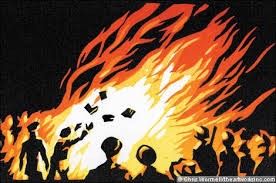Focus Questions:
How, and to what extent, will advanced technologies affect the lives of ordinary people?
Is it inevitable that current social and power structures will be the form of future social organisations?
What the text suggests:
The text suggests that technology is ruling peoples’ lives to the point that the line between reality and fiction is completely blurred. As a result the television shows seem more real than interacting with other people. Once again the text suggests that feeling connected to your inner thoughts is unusual and a threat to society.
The text suggests that the social power structures we have today will still form the future of social organisations but that the power of government and media is more controlling and evil. It seems that the powerful forces are determined to keep people ignorant and remove any threat of actual real thoughts. People think but only about what they are programmed to think. By doing this the government can keep people quiet and away from any wider world dramas.
How the text presents these ideas:
The idea that people have become overruled by technology is demonstrated when Montag is on the train and the passengers are mesmerised and lulled into a trance by the undertone of advertising.
“The people who had been sitting a moment before, tapping their feet to the rhythm Denham’s Dentifrice, Denham’s Dandy Dental Detergent, Denham’s Dentifrice, Denham’s Dentifrice, one two, one two three, one two, cone two three. The people whose mouths had been faintly twitching the words Dentifrice Dentifrice Dentifrice.”
When Montag connects with Faber, a possible threat to society because of his knowledge, Faber states what makes him different. “I don’t talk things, sir,” said Faber. “I talk the meaning of things. I sit here and know I’m alive.”
When Montag seeks Faber out as someone who might be able to help him make sense of his feelings, Montag explains his frustration.
“Nobody listens anymore. I can’t talk to the walls because they’re yelling at me. I can’t talk to my wife; she listens to the walls. I just want someone to hear what I have to say. And maybe if I talk long enough it’ll make sense. And I want you to teach me to understand what I read.”
It seems as if Montag’s initial meeting with Clarisse woke up a part of him that was curious about the world and his feelings. Since then Montag has questioned everything. He says: “I don’t know. We have everything we need to be happy, but we aren’t happy. Something’s missing. I looked around. The only thing I positively knew was gone was the books I’d burned in ten or twelve years. So I thought books might help.”
As for the power structures in Fahrenheit 451 it does appear that the government, business and the media are the most powerful forces. It seems like these forces are working together to keep the population distracted and occupied by fake happiness.
“I remember the newspapers dying like huge moths. No one wanted them back. No one missed them. And then the government, seeing how advantageous it was to have people reading only about passionate lips and the fist in the stomach, circled the situation with your fire-eaters.”
If people had time to stop and think about what was going on maybe that would question what the government was doing.
“We’ve started and won two atomic wars since 1990! Is it because we’re having so much fun at home we’ve forgotten the world? Is it because we’re so rich and the rest of the world’s so poor and we just don’t care if they are? I’ve heard rumours; the world is starving, but we’re well fed. Is it true the world works hard and we play?”
